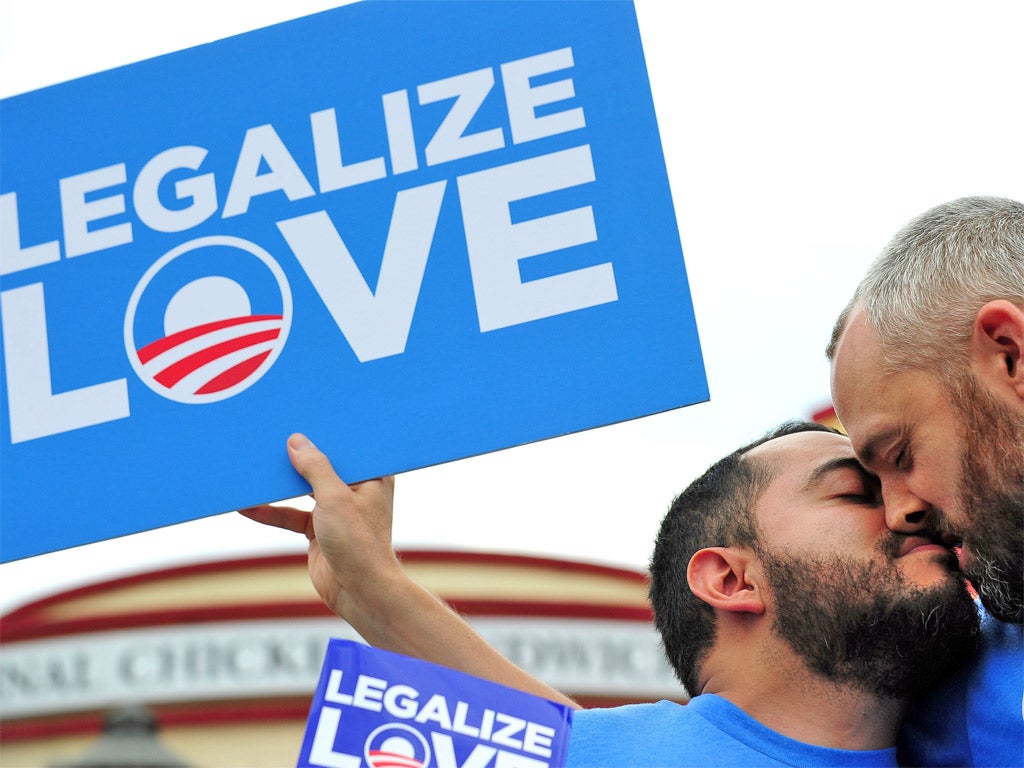The Independent's journalism is supported by our readers. When you purchase through links on our site, we may earn commission.
The United States Supreme Court shouldn't rush to legislate on same-sex marriage
Change is coming. But forcing states to accept their decision could lead to a backlash

Your support helps us to tell the story
From reproductive rights to climate change to Big Tech, The Independent is on the ground when the story is developing. Whether it's investigating the financials of Elon Musk's pro-Trump PAC or producing our latest documentary, 'The A Word', which shines a light on the American women fighting for reproductive rights, we know how important it is to parse out the facts from the messaging.
At such a critical moment in US history, we need reporters on the ground. Your donation allows us to keep sending journalists to speak to both sides of the story.
The Independent is trusted by Americans across the entire political spectrum. And unlike many other quality news outlets, we choose not to lock Americans out of our reporting and analysis with paywalls. We believe quality journalism should be available to everyone, paid for by those who can afford it.
Your support makes all the difference.It was only in 2003 that the United States Supreme Court invalidated 14 states’ laws criminalising sodomy. In 2013, the same court will hear two cases on the issue of gay marriage.
It has decided to hear both Hollingsworth v. Perry and United States v. Windsor. The former challenges California’s Proposition 8, which was passed by voters in 2008 to amend the state constitution to ban gay marriage. The latter confronts the Defense of Marriage Act, arguing that its definition of marriage as between a man and a woman is unconstitutional.
These two cases combined have the potential to lead to a landmark decision in the vein of Roe v. Wade, which legalised abortion. But most likely this won't happen, and neither should it.
A recent poll found that a surprising 51 per cent of Americans support the legalisation of same-sex marriages, up from 32 per cent in 2003.
This is a great jump, and indicative of the changing demographics that twice brought Obama to power. But such moderate support is obviously not evenly spread: for example, only 13 per cent of Mississippi voters are in favour.
The reaction of many vocal conservative Americans at the re-election of Barack Obama underlines the ideological split down the middle of America: Obama and his ilk are so unappealing that 80,000 Texans signed a petition to secede from the Union.
Clearly, a sweeping decision at a federal level on same-sex marriage would be greeted with similar tactics.
And there are fears that if the justices’ decision did indeed go to the heart of the issue — the constitutionality of same-sex marriage — they would invite a divisive, destructive ideological war.
Such a result would allow opponents of marriage equality to ride a wave of popular hysterical homophobia - and could set back the cause.
Cultural issues like abortion and same-sex marriage are often, conveniently for some, reduced to a battle between states’ and federal rights: morality is lost in the argument. The bloviating right-wing Supreme Court justice, Antonin Scalia, earlier this week said he thought it was ‘effective’ to draw parallels between murder and sodomy.
With this kind of language being bandied about even by federal judges, would it be possible to win an ideological war over same-sex marriage in America?
It is in the interests of marriage equality campaigners not to push for a vast, all-encompassing decision, but to keep working at a state level.
Equal
For one thing, it’s all too easy to get caught up in legal stalemate over such issues. But at the centre of United States v. Windsor is a heart-breaking love story which only serves to underline the necessity of marriage equality. Edie Windsor was engaged to Thea Spyer for 40 years, giving up her job as a computer programmer at IBM to become her carer as she battled multiple sclerosis. They finally got married, in Canada, as Spyer’s health worsened. She died two years later, and Windsor was stuck with a tax bill for over $350,000 that she would not have had to pay if she was married to a man.
As Windsor puts it: "It's not 'same-sex marriage.' It's marriage. It's marriage equality,"
Of course, the justices won’t be swayed by this story, or indeed those of hundreds of thousands of others in a similar limbo. But figures suggest that Americans are coming round to the idea.
2012 has been a bumper year in the march towards equality: Obama’s endorsement of gay marriage in May was followed by the election of the first openly gay senator in Wisconsin, as well as election victories for same-sex marriage in four states. Massachusetts representative Barney Frank married his partner in July, and even firebrand tea-partier Glenn Beck has hinted at backing gay marriage (though with his libertarian hat on, rather than his, erm, moral one).
In Britain, France and even Uruguay, same-sex marriage is on the cards. The simple fact that the court has deigned to decide two cases on marriage equality is groundbreaking. Let’s hope it doesn’t backfire.
Join our commenting forum
Join thought-provoking conversations, follow other Independent readers and see their replies
Comments